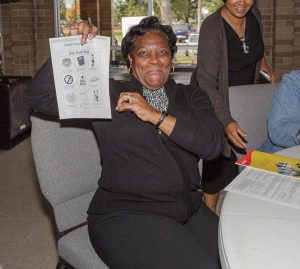Body and Soul
Training New Orleans Congregations to Mix Wellness with Spirituality

Wellness ministry leader Gwen Robinson during training for CW’s weight loss project STAR.
In a network of 87 churches in Greater New Orleans, BCM wellness ministry leaders guide members of their congregations to blend health, healing and wholeness, integrating spirituality and wellness.
“That’s the difference between our program and other community health programs in the area,” says Frances Hawkins, Vice President of Congregational Wellness.
The staff of CW trains registered nurses and lay health volunteers as wellness ministry leaders in their own congregations. Since 1997 when the program started, 500 wellness ministry leaders have been trained and have encouraged their fellow congregants to follow healthier lifestyles. Twenty new lay persons and eight nurses became wellness ministry leaders in 2014.
The CW volunteers do not treat patients in the churches. Instead faith-based community nurses and lay health advocates take a spiritual approach to teaching health, nutrition and exercise to congregants and helping them access appropriate resources and care.
One of the CW’s faith-based initiatives, the Strategies To Trim and Reduce (STAR) Project was started as a pilot in 2011. STAR has demonstrated resounding benefits in educating congregants and engaging them in health promotion activities that have resulted in enhancing their knowledge and skills in blood pressure control and weight reduction. The overarching goal has been to incorporate healthy living into daily routines that influences changes in lifestyle. The program is conducted over a 13-week period, two hours per week. Spirituality continues to be a focus combined with addressing the body systems, nutrition, exercise and stress management. Forty churches have participated in the project, 106 wellness leaders have been trained and over 400 congregants and community residents have attended the classes.
Carol Joshua, a registered nurse for nearly four decades, is a church nurse at Branch Bell Missionary Baptist Church. She says fellow congregants appreciate the CW program. “There’s a scripture that says our people perish from a lack of knowledge and what we try to do is bring that knowledge to the congregation to improve the overall health,” she says. “With the African-American congregation we identify certain things that seem to plague us like diabetes, high blood pressure, obesity. So those are the things we try to address.”
One way to combat those ailments is the STAR Project. About one-fourth (28) of Joshua’s fellow congregants signed up, and 93 percent who joined finished the program. Among the STAR congregants in all of the participating churches, 72 percent lost weight, averaging around four pounds per person and blood pressure was lowered for about a third of the participants.
Joshua saw some dramatic examples in her church. One woman lost 43 pounds during the 13-week program. Joshua says another had blood pressure so high she suggested she go to the emergency room. “She would not go to the emergency room, but the next day I followed up with her with a personal telephone call and I found out that her diet was just loaded with salt,” Joshua recalls. “That very day I told her, now if you just eliminate the salty snacks… we’re going to see a dramatic decrease in your blood pressure.” Joshua’s sodium warnings, plus her encouragement to the woman to refill her medications, resulted in a significant improvement in just one week and a return to normal range by the end of the STAR sessions. Joshua was happy to report she presented the woman with a trophy.
Gwen Robinson has served as a lay wellness ministry leader nearly four years at the Shiloh Christian Fellowship Baptist Church. She says her fellow church members are eager to try STAR.
“Usually they’re excited. They’re just glad we have something at church to help themselves and we have fun doing it,” she says. Robinson credits her CW training with helping her church members make meaningful changes. “McFarland is wonderful. All the things they give me, I can direct people to resources, a lot of resources, something they wouldn’t normally know about.”
“Our programs are really ministries within their congregations, connecting the dots to ensure wellness. They focus on and establish a safety net to address their needs and the needs of the community,” says Hawkins. “The ministry leaders are not compensated monetarily, but the rewards they receive are priceless. To them, this labor is a ministry, a true calling.”